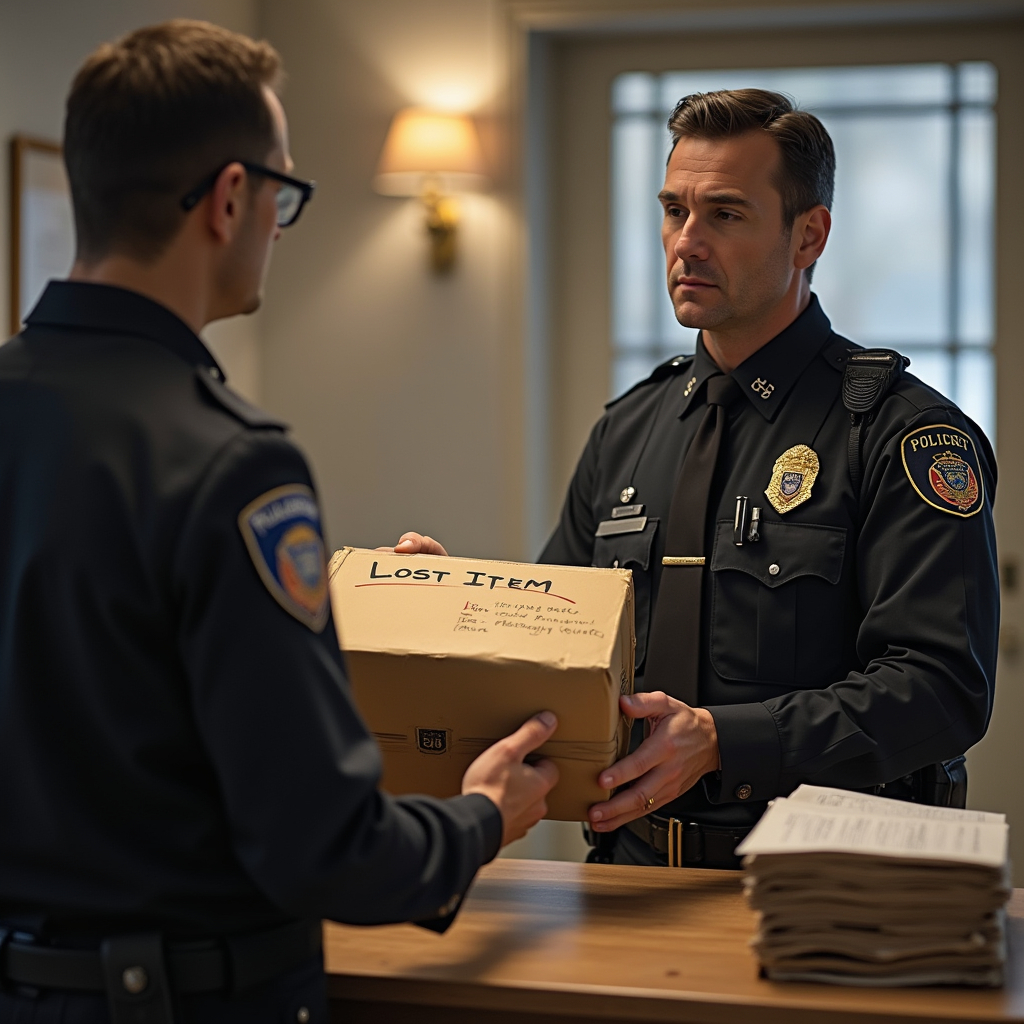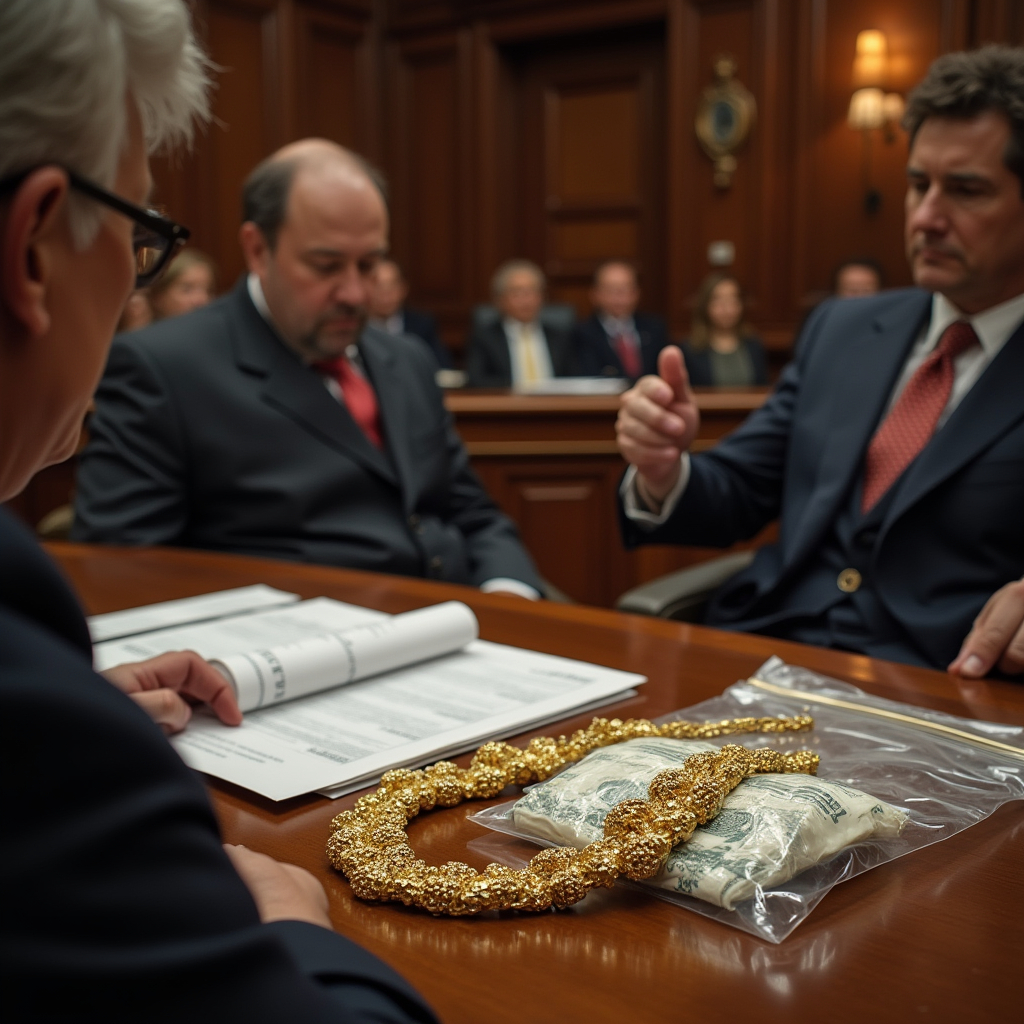This article has been written by Charu Kohli. The present article elaborates on the derivative rights and duties of a person who finds goods that are lost. Further, it deals with the contractual obligations and rewards, which might attach to finding such goods along with case laws to make one understand the topic better.
This article has been published by Shashwat Kaushik.
Table of Contents
Introduction
Imagine a situation where on your way to the court you found a black wallet lying on the footpath. Now imagine what would be your first reaction? Would you pick it up and keep it or try to find the real owner of the wallet? A reasonable and prudent citizen will look out for some documents of some kind to discover the original owner or will turn it into the nearest police station.
Therefore, in this case, the person who has found the wallet is the finder and is hereby bound by certain rights and duties. Let us now begin this article by understanding that the finder of the lost goods is that person who, without a relation to the particular good in the scenario. He or she as the case may be is the one who finds the good while the owner of the good misplaces it. This article will help you in understanding the same by elucidating upon those rights and duties of the finder.
But before diving into the concept of rights and duties, we need to touch upon the basic understanding of the topic. Let us start by understanding the meaning of finder of lost goods.
Finder of lost goods
The term finder of goods must be construed upon by us in order to get a better grasp on the rights and duties in the subsequent sections. So, you and I generally understand that a finder is someone who finds lost goods. He or she in such a case takes the possession of such goods for the time-being, till the actual owner is found. The finder assumes the status of a bailee as per the law. That allows one to understand the rights and duties of a finder.
Since you are an avid reader and wish to read more about bailment and the bailee, refer to the blog here and learn about the same. Also here in order to get even more clarity into the concept and to understand how it is different from the topic of pledge, refer here. Let us now jump back into understanding the topic at hand. Now, the definition of the finder could be illustrated by the following example:
Suppose that while you are walking on the road outside your house, you found a gold anklet. As it is in your possession, you are to be the finder of that lost good. The original owner is unknown and sure enough, those goods are to be declared lost, on that ground of being out of possession. In this instance, you will become the holder, as they are under your possession.
But now the question in your mind would be, what are lost goods? The first thing we need to do is contrast goods that are lost by those that were just misplaced to help clarify the meaning of lost goods. This will help crystallize what is the actual meaning of lost goods. So let’s get into it further on.
Lost goods vs. misplaced goods
An easier explanation would be that the goods are said to be lost whenever they are absent from the power of an owner. This displacement from the owner is one which can take place intentionally or unintentionally by the true owner of the goods itself. However, on the other hand, if there is unintentional forgetfulness and absent mindedness of the owner. This makes him or her forget altogether, that he or she left something out, then the goods have just been misplaced.
Before we understand further, let us work through an example to clarify the difference in a better way.
One night Vivek puts his sunglasses on a table in his hotel room. He goes away without them for the entire time during his holidays and finally finds them later while packing. This means that, if they have generally been found in such a case, then the sunglasses must have been misplaced but not lost.
However, if after that he has completely forgotten about it, the hotel staff will have a duty of care for the sunglasses because they have found them. This is the time when the goods have been lost due to the absent mindedness of Vivek.
Now before we proceed into another subject, we must first focus on the relationship between the owner of the goods and the finder. It’s time for us to dig deep into its nature and understand it better.

Nature of relationship between finder and actual owner
The relationship between the finder of a lost good and the owner of such good may very well resemble the nature of a contract. It is the Indian Contract Act of 1872 which provides in Chapter V the rights and liabilities that arise, which bear some relation to a contract. In other words, the term used for this resemblance to a contract is called quasi-contract. The terminology was borrowed from the legal nomenclature of English law.
The quasi-contractual relationship will then be one existing between the finder of the goods and the real owner. So in order to get more clarity on the concept of relationship, we need to look into what is a quasi contract. Now, let us dwell into the next segment of the article to understand the same.
Quasi contract
Firstly, we need to keep in our minds that a quasi-contract is distinguishable from a contract. Therefore, remember that a quasi-contract resembles but it is not equal to an actual contract. Here we are already aware that the term ‘Contract’ is defined under Section 2(h) of the 1872 Act. It basically states that a legal agreement enforceable by law is termed a contract.
So what are quasi contracts? Let us have a look. It is interesting to note that quasi-contracts are not actual contracts but are more ‘like’ contracts. But when do these contracts come into the picture? So, in some situations, when there is no contractual duty between the parties then quasi contracts come into being. It is not only that while forming a real contract the law enforces parties to have certain rights and duties. But also, when there is no contract between parties can this situation arise and that is referred to as a quasi contract.
From this, it is clear that a ‘quasi-contract’ refers to an arrangement where the parties do not intend to create a contract. But by law, such contractual obligations are imposed on them. Let us illustrate this with an example:
For example, when, by pure mistake, you forget your wristwatch in some shop. The owner becomes under an obligation to return the watch back to you as the owner of the watch. Now, if by chance the watch is broken by him, he is bound to pay you its value.
It is on that principle that no man shall profit at another’s expense. Such quasi-contract for all practical purposes serves as a valid contract as they are in line with the principles of equality. The principle of equality which says that no person can be allowed to enrich himself at another’s expense. We shall, therefore, look at these principles with clarity to throw more light on the nexus between the right and an obligation of a finder of goods.
Further, the avid readers who wish to learn more about quasi contracts can refer to this blog.
Principles of quasi contract
There are two principle theories on which the quasi contracts are based and these principles are:
- Implied contract: As the name here suggests that there is no formal or express agreement which exists between the parties. So here in such cases, the persons involved have a distinctive relationship which exists without any express conditions set by the parties.
- Theory of unjust enrichment: This theory based on moral laws states that no person shall be allowed to gain at the cost of others. Moreover, this theory believes it to be against the interests of justice for anyone to get unjust enrichment.
On these principles, every mentioned quasi contract is thereafter under Section 71 of the Indian Contract Act, 1872, which deals with the quasi contractual relationship between a finder of lost goods and an owner. Further, in order to get a view of the critical analysis of Section 71, one can refer to this blog.
Let us now dive into Section 71 to understand the ambit of quasi contracts.
Role and responsibility of the finder of lost goods
Since the lost goods are found by someone, then there should be some legal notion regarding the role and responsibility of the finder. So, let us look at them. As we already know that the responsibility of the finder of goods is mentioned under the ambit of Section 71 of the Indian Contract Act, 1872. A person who finds the goods which belong to another person and takes them into custody despite not being the actual owner of the goods is the finder of the goods.
Let us look at an illustration to get more clarity on the concept.

Hira, who is a guest at Payal’s party, finds a diamond brooch near the staircase. On finding it she announces the same on the mic. Moreover, she asks the owner to come and contact her. In this case, as a reasonable finder, she has tried to find the actual owner of the goods. Thus, the finder successfully carried out the responsibility of trying to find the actual owner of a lost good.
It can be stated that according to Section 71 of the Indian Contract Act, 1872 when a person finds the goods which belong to someone else and takes them into his or her own custody then that person is to be governed by the same rules as that of a bailee. It simply means that the legal position under the Indian Contract Act, 1872 of a finder of goods is that of a bailee.
A bailee is the person to whom the goods are transferred by the owner in order for the person of either custody or repair. It is only a delivery under the Contract Act and not the transfer of ownership of the goods.
Therefore the finder of the goods is the one who is supposed to not only take reasonable care and caution in regards to the goods found by him but he is the one empowered with the rights of a bailee under the ambit of Section 151.
The main aim of this Section is to ensure that the finder does not make any restitution of a benefit at the expense of the owner which is unjust and unlawful. Therefore, the finder of goods has a quasi contract with the owner of the goods. Further, since the finder is bound to the legal obligations since it is a quasi contract, let us understand the rights and duties. This will be followed by case laws for a better illustrative explanation.
Rights of finder of goods
The rights are that the finder must receive compensation from the owner by way of recovery of expenses incurred, and the reward announced by the owner, if any. Moreover, they also have the right to sell the goods when they are perishable in nature among other rights. The Indian Contract Act, 1872 thus outlines certain rights for a finder of goods in Sections 168 and 169; so, for better comprehension of these rights, those are elaborated with illustrations below.
Now let us deep dive into the understanding of the various rights.
Right of particular lien and retainment of goods
The first right is according to Section 168. This right states that every finder of goods does not have the right against an owner to repay for any trouble or expenses incurred by him. Thus even in cases when the finder of the good voluntarily incurs any expense which is in order to preserve the good or to find its real owner then also the same cannot be made to repay for compulsorily.
It simply means that the finder of goods does not have the right to see the owner for payment in regard to any trouble or voluntary expense incurred by him. However, it is important to note that the finder of the good has the right of a particular lien in respect of such good.
It basically means that he can retain the goods himself unless and until he is compensated for the expenses or troubles incurred by him in order to preserve the goods. Therefore the right of lien is one bearing the person can sue the owner of the goods in cases when such a person goes through the trouble or spends the purse in preserving such goods.
Illustration: In case when Priya found a gold chain in the main market area of a village and in order to find the owner of the gold chain she had the local newspaper print a column under their lost and found section regarding the chain. Then in such a case, it is the duty of the owner to ensure and acknowledge the contribution of person Priya in helping the owner find their chain before claiming it.
There is one more clause attached to Section 168, let us read that now.
Right of claiming the reward if announced by the owner
Section 168 provides for the right of a finder of goods to remunerate himself for his expenses or trouble until he can get some reward from the owner. Such trouble and expense are ones which have arisen during the time of preserving the goods or to find the owner for those goods with the sole intention of returning them. Besides this right, under this section, the finder of good has also other rights.
One such right is he can receive such specific reward or compensation from the actual owner of the goods. Such reward has to be specific in nature and is to be paid by the actual owner of the goods. Until he receives this reward he may sue, or retain the goods of the owner until the reward is received.

Illustration: If Bina pasted missing posters of his bike along with the tagline “Rs. 500 to whoever finds the bike.” In case, where Cheema finds the same on an empty alley then it is the right of Cheema to get the Rs. 500 as an award from Bina.
In fact in the case when the actual owner of the goods has stated that he or she will be a certain sum as a reward to the finder of the goods then they have to pay the same to the finder. Also, it is interesting to note that if the owner of the goods promises to compensate the one who has found the goods for his voluntary act done in the past then also the contract will be binding and the owner will have to pay some as promised.
Illustration: If Arpit finds the gold pen and inkpot of Gaurav voluntarily and Gaurav states that she will pay Arpit an award of Rs. 500 for his act, then Gaurav is bound by contract to pay the same and Arpit can even sue if the same is not fulfilled.
Next up, we will be studying the right of a finder to sell the goods and the specific circumstances under which this right is available.
Right to sell the goods found
The goods found can, according to the provisions contained in Section 169, be sold by the finder only in those cases where there lays some exceptional circumstances. It is quite specific that such circumstances arise only when the actual owner of the goods cannot be found. It is to be so in cases where even after the finder has thoroughly searched for and made very reasonable inquiries are made, the owner is not found.
Moreover, if the true owner refuses upon demand to pay the finder the fees that he ought to pay the finder. In such a case, the goods could be offered for sale by the finder of the goods. Let us now look at the cases in detail when you can sell the goods as a finder. So, the right of sale of the finder is present if:
True owner cannot, even with reasonable diligence, be found
In the circumstance of abandonment, the finder is guaranteed “reasonable time and exhortation” to find the owner. If, after full inquiry and reasonable efforts on the part of the finder to locate the owner, there is still no owner identifiable, the finder may sell the property.
Illustration: Bittu found a gaming console in the park. He, like a reasonable person, spent a reasonable amount of time trying to find the owner. For this, he not only contacted the police and the park guard but also informed the community lost and found department to get the news printed in their monthly list of goods found. Now a lot of time has passed and no one is claiming the property within the community, so he has the right to sell off the gaming console.
If the owner of the good refuses to pay the charges that he/she is legally bound to pay to the finder
If the owner of the goods shows unyieldingness to pay the charges which he/she has to legally pay to the finder. Then in such a case, the finder will have the right to sell the goods.
For example: Nirmal on his trip to Jammu lost his camera. He is a resident of Kerala. This camera was found by the hotel owner Mohan. When Mohan contacted Nirmal, the owner asked for its delivery. But here he stated that he will not pay the delivery charges and that Mohan should pay the same. Since here his legal duty is to pay the charges which he fails, Mohan can sell the camera.
When the goods run the risk of losing their market value, and there is an urgent need to dispose of them
Perishable goods such as edible items like fruits and vegetables will rot after some time and, therefore, with time, they lose their market value. So, to avoid the loss of the value of the goods before the true owner is found, and for an opportunity for the owner to still have at least some benefit out of the lost properties, he/she can’t sell the goods. Let us look at an illustration for a better grip on the concept.
Illustration: Joy comes across a cart full of apples standing on the roadside alley. He undertakes an enquiry and makes a great deal of fuss to detect its owner. After all these measures have been put in place and passing of two months also if he is unable to detect the owner. Then in such a case, he can sell the apples if the owner remains consistently elusive. Later, if it is determined who actually owns them, he can give him back whatever that was left over from the sale to him.
When the reasonable expenses amount to two-thirds of the value of the property under consideration
In cases when the reasonable expenses which have been borne out of the pockets of the finder exceed two third the actual value of the good, then the finder has the right to sell the goods. Here the expenses incurred by the finder should only be in respect to the thing found by him. Also, a point to be remembered is that the amount of expenses should amount to atleast two-thirds or more of the value of the property which is under consideration.

For example, suppose Himant found a pen worth Rs. 20 and tried his best to find the owner by asking around but could not find anyone to identify as the owner. In such a case, it is worthwhile to sell the pen, considering the effort that is going into finding the owner would be greater than Rs. 20 itself.
Since we have covered the rights of finder of goods in detail, now let us jump into the next section and study the duties.
Duties of finder of any lost goods
All coins have two sides, and the finder has the right to protect himself and have protection. Accordingly, he should also exercise the same honesty and reasonableness to the actual owner of the goods. The finder of a lost good is neither an actual owner of those goods, but he is a special class of bailee of those goods. As such bailee of the goods, he has the duty to take care until he finds the real, actual owner and returns the goods to him.
For the cases in which someone is acting in the position of a finder, he or she has to take care that the set of duties occurs as in the case of a bailee. They are attached with them and thereby the finder will act as a reasonable man would have throughout under the given circumstance.
Now let us look at the Sections 151 to 163 of the Indian Contract Act, 1972 which deal with duties of finder of lost goods. The duties of a finder of any lost goods can be listed as:
Duty to find the owner
The primary duty when we talk about the lost goods is to locate the true owner of those finds. Here the burden of finding the real owner, in actuality, rests upon the shoulders of the finder of the goods. This must have been the most basic of things every finder would have been bound to follow. It is quite an elaborate job to delineate that a person would not have taken possession of goods lost to an inhabitant under the law if the goods were found in their own land.
On the occasion when the actual owner is found on their land; they ought to find the owner of the lost goods and take them into their possession. The moment these goods have come under the finder’s possession he has got the legal position of a bailee of the goods. Therefore, remember in this case, they have to shoulder the duties of a bailee.
Illustration: Riya during his journey finds a watch on the train from Meerut to Kolkata. Now she has to step into the role of a bailee and she must take reasonable steps to find the owner of the watch. To note here is that these reasonable steps may include asking other passengers and notifying the ticket inspector about the watch. Moreover, these steps can also include informing the lost and found department of the railway.
Duty to take reasonable care of goods
Section 151 of this act meticulously endows the finder with another set of duties. This duty is based on the principle of due care. Now what does due care entail? It means that the finder needs to take reasonable care in respect of the goods found by him. Once again you will notice that the duty flows from the standpoint of the protection of the goods by an ordinary man. This care must be similar to what he will give to his own goods.
So, in case if the person finds a good and takes it into his possession, he later has to take care of the goods in a reasonable manner also. But the point to be noted here is that he simply cannot defend himself in case of harm or loss of goods by merely stating that he took care of his goods in a similar manner. Rather, he will be liable to prove in front of the court that his reasonable care was similar to what an ordinary man would have done in his place.
For example, if Bhumit finds the gold ring on the table of the factory and puts it on a shelf with his own valuables and, later, it is lost from there, he cannot plead that he had kept his own valuables there also. Rather, in this case, it will be upon him to establish that putting the ring on the shelf was reasonable and, indeed, the safest place. This is the case wherein, to prove his grievance, he should show that any reasonable man(if appeared in real life) would have acted in the same manner under the same circumstances.
In Kavita Trehan v. Balsara Hygiene Products Ltd. (AIR 1992 Del 103), the court has pointed out that in all cases of bailment, the extent of care shall be the care which, in similar circumstances, a man of ordinary prudence would render. Since the finder is a bailee, he is bound to exercise reasonable care.

Section 152 mentions, that in the absence of a special contract between the parties, if the finder of the goods has in his possession taken reasonable care thereof, he shall not be liable. Any finder of lost goods shall not be liable for negligence in respect of the loss or destruction of the goods, provided that the loss was beyond his control and that in any case, he took ordinary care of the goods.
For example, Zila found a pair of earbuds on the street, so she is obliged to take ordinary care of them. Here Zila should not play with them or experiment with them but rather store them appropriately in a safe place.
Duty not to make unauthorised or personal use of goods
Section 153 is the one which purports to terminate bailment by the finder of goods. It so happens in the cases when the actions of such a finder go contrary to the conditions that were expressly stated in the contract. A contract of bailment is a contract revocable or voidable only at the option of the true owner.
Since the finder therefore has similar duties to those of the bailee and no express contract exists, the finder should not use goods for self-use. A finder shall be liable for any kind of unsupported use of the good. The only duty the finder has towards the found goods is that they shall not make any sort of unsupported use of the found goods.
Then again, Section 154 states liability for the finder of the goods shall arise in case there is an unauthorised use of the goods. The section expressly sentences the finder of the goods to pay for any and all damages occurring during or as a result of the finder making some kind of unauthorised use of the goods.
Thus, it is clear that a finder is not the owner of goods and cannot use the found goods for personal needs. It, therefore, follows in such cases, where any unauthorised use has occurred, compensation will have to be paid for the finder.
Illustration: If a bag full of clothes falls from a truck transporting them from Delhi to Kanpur, Rohit, finds it lying on the highway, and without even initiating inquiries about the real owner of the clothes, starts utilizing the same for his own needs. Then, in that case, he will be bound to compensate the owner of the bag of clothes.
Duty not to put adverse title on the goods
A very important duty which the finder of the good must perform is to ensure that the good be returned to its owner. It is tantamount to a breach of the principles of natural justice to allow the finder to set up squatter’s rights over the good of another.
In simple words, you can say that the squatter’s rights dictate that no individual or corporation should be allowed to occupy a property for which they do not have a legal claim with themselves. Thus, the most important thing to note here is that unless the finder of the good has tried reasonably to find the owner of the good and this has failed, he should be quite unable to put forward any claim of the adverse title with respect to the good.
Illustration: Krrish has no right to impose an adverse title over the box of diamonds he has just found on his way to the weekly market.
Duty not to mix goods
Three sections of the Indian Contract Act, 1872 deal with the effect of the mixture of goods:
Section 155 of the Indian Contract Act, 1872
The first type of mixture of goods is present under the ambit of Section 155 which states that the mixture when made with the consent of the owner. In case there is the owner’s consent involved while mixing the goods of both the finder as well as the owner, then both of them will receive an interest in the proportion to their respective shares.
It simply means that in this case, the true owner of the goods has given his or her consent to the finder of the goods to mix them and the distribution would be in regards to the shares of both the parties involved.
Illustration: Suppose Adam mixes the rice of both his and that of Clara with the consent of Clara. In this case, if the proportion was such that 5 kg rice belongs to Adam and 10 kgs belongs to Clara then the interest will be divided as per this share only. Here Clara will receive the interest over the 10 kgs of rice whereas Adam will only receive the interest over the 5 kgs.
Section 156 of the Indian Contract Act, 1872
This second kind of mixture of goods arises when the consent of the true owner is missing. Section 156 deals with a situation where the consent of the owner is not there, but the goods finally mixed are separable. Here both the finder of the goods as well as the owner of the goods, will receive their respective due share only.
But remember here that it was the finder of the goods who had mixed without the permission of the owner. Therefore, he shall be the only one who will be bound to bear the costs of separation. Moreover, any damages that may arise out of the mixture will also come out of the finder’s pockets only.

So let us take a look at Shubham, who owned 10 pairs of Nike shoes. He mixed his shoes with those of Kartik without his consent. Kartik owned 10 pairs of Adidas shoes. During mixing the shoes, one of the pairs of the Adidas shoes is torn. Therefore, Shubham will be liable for the separation of the shoes from the mix of which he is guilty. In addition, he will be liable to make good the loss suffered as a result of torn shoes.
Section 157 of the Indian Contract Act, 1872
A third type of mixture is achieved when there is no permission from the owner. Also in this case, the goods are such that they cannot be separated from each other. In this case, the law will speak about the loss of goods. Under the express provision of law, the true owner can, therefore, be compensated only by the finder of the goods.
Section 157 clearly discusses this instance and provides that the finder/bailee of the goods shall have to compensate the true owner for the loss of the same.
Illustration: If Mira, without permission of Neelam, mixes cow milk produced in his diary with that obtained from Neelam’s dairy’s goat milk, then it is the duty and responsibility of Mira to compensate Neelam for mix-up
After focusing on the sections, we can put forth that if the finder also gets the goods made to mix and integrate with those of the owner who did not give the former permission, he is bound either to separate them or give equal division between the parties. In this case, he will also have to pay for separating the goods.
Illustration: If Paul finds two bags lying near his shop and takes those away with himself without taking proper care to find the owner. Here one of the bags contained rice and the second contained soft toys. In this Paul mixes both bags with his own rice and soft toys.
So in this case, when the true owner is found then it will be the responsibility of Paul to separate the toys. Also, it shall be his responsibility to give back the rice to its actual owner. Remember that in this case, if any expenses are present while unmixing then it will be Paul who will be paying it.
Duty to return goods
Let us now dwell into Section 160, of the Act and see how it relates to the duty of returning the goods. This Section clearly states that the finder has to return the goods before the stipulated time gets over. Also, interestingly this section states that once the purpose for which the goods were taken has been fulfilled, the goods must be returned to the true owner.
But now you might be wondering how taking of goods can stand equivalent to finding? So the answer is simple: we will only consider the part of the section which talks about returning goods. Since in the cases of the finder, the goods were never bailed to the finder.
Remember Section 160 lays down that he or she shall return the found goods or deliver them to the true owner. This means that the finder has to send back the goods to the owner once such an owner is found. Therefore, in any case of goods being found, it is the duty of the finder to deliver such goods back to the owner as prescribed in the section.
Suppose Ankit is the true owner of an iPad. Here Ankit instructs Vivek, who is the finder, to hand over the iPad to his representative. He further gives instructions that the representative will reach Vivek’s house on 12 November 2024 by 12 o’clock noon. In such an event, Vivek must perform his duty to hand the iPad over to representatives on the specified day and time.
The provisions of Section 161 further states that in cases when the goods are returned, delivered or tendered on time then the finder will be responsible. So if he does not return it, however, and it is lost, then he will be liable. Whether the goods are not delivered or tendered in time will lead to the liability will remain. Therefore, the finder in such cases will have to bear the expenses of any loss, destruction or deterioration of the goods.
Here is a scenario for your better understanding. Bhoomi finds, after due diligence and reasonable search, that the owner of the gold ring is Charvi. Therefore she must return the gold ring to Charvi; if she does not, she will become liable for the loss.
Duty to return profits on goods and render accounts
Section 163 provides us with the provision that states that any profits that may accrue to the finder of the lost goods are to be given back by him to the owner. Profits gained in this context by the finder must be viewed as any profits he is competent to make on her behalf due to the goods.
Thus, it must be an accepted principle that the real owner should be the one to earn the profit and not the finder. Thus, also all accounts and expenditures are being pleaded on behalf of the goods owner.

Illustration: If Oberoi, who finds oranges, sold them because they were of perishing value, liable to represent accounts of profits made and hand the actual owners the profits, rather than keeping it all for himself.
Since we have covered both the rights as well as the duties of the finder of lost goods, let us now read into the case laws related to the same. These case laws will help us in developing a better concept clarity and understanding. Let us begin.
Case laws on rights and duties of finder of goods
Newman vs. Bourne (1915)
The case Newman vs. Bourne (1915), 31 TLR 209, concerns a brooch lost by the plaintiff. In this case, the brooch was found by the defendant. This brooch was of the plaintiff which he had forgotten in the defendant’s shop. The defendant had taken it into the store to save it from theft. However, later on, while closing the store, he discovered that the brooch was no longer there. Moreover, the drawer was closed.
In this case, the defendant was held by the court to be the finder. Therefore, the court held that it was his duty to take reasonable care of the goods. But since in this case, he had not taken care therefore, he was held liable.
Union of India (UOI) vs. Mahammad Khan (1958)
In this case, the timber owned by the plaintiffs had been discovered on the land belonging to the defendants. This land was leased out to the defendants. The defendant saw that there was timber on this land and wanted the owners of the timber to remove it. However, they did not remove it, and he had to get the site cleared.
During this clearing, the timber was damaged. The plaintiff argued that since reasonable care was not exercised over the timber, they were entitled to compensation. However, the defendant was not a finder, as he had not acted as a bailee or exercised care with respect to the timber. However, he could not be considered a finder under the ambit of Section 71 of the Indian Contracts Act, 1872.
This case of the Orissa High Court decided that since the defendant had not taken possession of the goods, he could not therefore be regarded as the finder of the goods. So, the compensation was not given to the plaintiffs.
Union of India vs. Amar Singh (1960)
The case started with its facts leading back to 1947, the respondent wanted his shipment of goods reserved in the N.W. Railway. The goods had reached the Indian border, and the next year, they were sent to New Delhi, where he could not find them when invited to take possession. Part of the goods and freight were delivered to him afterwards. The respondent treated the railways as guilty of neglecting their duties and took his grievance to court with a suit for damages.
Whereas the Supreme Court of India held that a contract of bailment existed between the respondent and the Forwarding Railway. Whether or not a contract was implied must be construed from the conduct of a respondent and the act of the Forwarding Railway taking custody of the goods. Here it was observed that the acknowledgment of a contract of a bailment is recognized by law as merely an implied engagement within Section 71.
If the Railway Administration in Pakistan authorized their confinement on Indian grounds, the Forwarding Railway administration would be a bailee concerning the goods in question. The court distinguished the contract entered into by the party’s conduct from one that will be quasi-implied by law. The Forwarding Railway was held guilty of some degree of negligence in this case.
State of Bombay (Now Gujarat) vs. Memon Mahomed Haji Hasam (1967)
In the case of the State of Bombay (Now Gujarat) vs. Memon Mahomed Haji Hasam (1965), the finder of lost goods was treated as a bailee with special duties toward the owner’s goods resembling those of a bailee. In this case, the Junggarh Sea Customs Act No. (Il) of the year S. Y. 1998 imposed restrictions, and the vehicle owned by the respondent was seized. So here, the vehicles remained in the custody of the police for years on end, and ultimately nothing was done by the real owners to reclaim them.
So after several years, the police sold these as unclaimed property in accordance with Section 523 of the Criminal Procedure Code, 1973. It was thereafter stated that either the vehicles should be restored or they should be compensated for monetarily. This was said on the basis of the argument that this was the liability of the State.
The Supreme Court stated in this matter that if the State is not said to be in a position of bailee, then the State was bound to return the goods as ordained by law. Here, there is nothing which could possibly exonerate the State on this one, as these vehicles were auctioned in accordance with the statutory obligation imposed by the law.

Still, the State or government stands liable to pay the value of the vehicles to the respondent. This arose due to a condition when the state could no longer return the vehicles owing to the State’s agents’ actions, whereby the police had sold the vehicles.
Now let us understand the consequences that one would have to face when he/she does not comply with the duties of a bailee as the finder of lost goods.
Consequences of non-compiling with duties
Under the Indian Contract Act, 1872, finders of lost goods only have duties and obligations like those of a bailee. It should be noted here that non compliance on the part of a bailee shall not impose liability against any of the parties concerned in matters of this kind. It is because there is no ostensible contract between the parties rather the contract is quasi in nature. Therefore, the finder has duties and personal responsibilities closely akin to those of a bailee.
However, in cases where the finder has used the property for his own or other persons purpose, then it has been labelled as criminal misappropriation of property. So a breach in the duty to try and find the actual owner and rather using the goods for one’s own use leads to criminal misappropriation. Further, in cases where the finder converts the ownership of goods in his or her own, then he or she is liable for conversion of goods. Here the finder uses the goods only for his personal use.
Since, we have covered the consequences of non-compliance of duties by the finder. Let us jump to the next section and look at all the ways in which this provision of law can be misused.
Limitations and potential misuses
Now it becomes important for us to notice that there are various limitations as well as potential misuse of the lost goods by both the finder of such goods as well as the claimant. Interestingly, the finder of lost property is the one person who is directly presented with a moral, legal, and practical set of issues. These ranges due to all of them having diverse natures and different probabilities of activities that somehow manage to diverge with varying jurisdictions and situations.
Limitations of lost goods reaching true owner
Let us now discuss some of the most important limitations and their plausible solutions which are to be borne in mind while doing such a varying act and possible misuse of:
Reporting issue
When determining what is to be done upon finding lost goods, consideration is given to whether or not one is able to report to the right persons. This begs another important question: which organizations are responsible to handle cases of the loss and which are worth reporting to the police officers or community aid centers?
Geography and accessibility of the authorities from where the items have been lost need to be looked into for a solution. In the cases of Indian jurisdiction, it is easier to reach the police station or booth on every corner. A local checkpoint could probably be the reporting center used for reporting in mountain areas.
Reasonable time issue
It is, however, considered important to wait for a certain time before dispossession of the lost goods, giving the authorities, or the owners, time enough to claim them. But the question is, what is the time to wait? Days, months, or years? In case the goods are of a perishable nature, the finder is given the duty to dispose of these before they perish. This can, however, only be determined in accordance with the facts of the case and by the finder only, based on his reasonableness.
So, here it is important to note that the nature of goods and reasonable care, in such cases, become paramount. In all such cases, the time up to which the goods may either be consumed or brought into the notice of proper authorities shall depend on how an ordinarily prudent man would act in such situations as reasonable. This means that he has to avoid the use or sale of the property until a rightful owner can be discovered.
Ownership claims
Ownership claims can be numerous. It can be so, as numerous individuals can lay claims for the ownership of goods discovered by the person. The weight of those claims is to be checked and rechecked before handing out the goods. It is in situations like these that the Hon’ble court of law steps in to decide the actual owner. Many times, though this does have some disadvantages, particularly when the bona fide owner has to fight several battles in court to establish ownership over the goods.

Potential misuses of lost goods
Since we have covered the limitations that may arise and depend from case to case situation, it is now time we study the potential abuses as well. So, the potential abuses that follow from loss of found property by an individual include the following:
- Condemnation or theft of the lost property is one of the potential misuses of the property found by a person. According to legal definition, the finder keeping goods without any reasonable effort towards locating the original owner has theoretically committed theft.
- Exploitation of goods which here means the act using such found goods for one’s own profit. This basically means when a person sells the goods found by him for a great profit before practicing due diligence to establish the rightful owner. Such an act by the finder of the lost goods is both immoral and illegal in most parts of the world.
- Destruction caused to the goods found, whether it be via willful damage or willful neglect. This is in regard to a found item and may mean a complete loss for the rightful owner and is an actionable case in court.
- Negligence means when a finder fails to take reasonable care in respect of the goods. Thereto he or she may be held liable for any damage or destruction on that property. This liability would resemble that of a bailee as envisaged under Sections 151-152 of the Indian Contract Act as we have discussed above.
- If goods not belonging to an individual are kept and used by another individual without any attempts to find out the true owner, he or she is then liable either for conversion or theft in accordance with the IPC. This is the act of misappropriating the goods so found.
- False claim of ownership is also a potential misuse which we should take into account. If one person lays a conscious fraudulent claim to the ownership of a found item or gives falsified documents as evidence of ownership of that item, he or she is basically committing an act of fraud. If the finder has made a false claim to ownership over the goods or has unduly prevented the true original owner from getting them back, such conduct constitutes fraud under the auspices of civil and criminal laws also.
- Transactions in the black market of such goods which were lost. Such persons who found these goods are sometimes who engage in the unlawful transaction of selling valuable or culturally significant, found, property. This denies the property any semblance of legitimacy or morality.
Now let us take a look at the various challenges that may arise in this arena of law.
Challenges
Now you might be wondering what are the challenges related to lost goods? So it becomes essential for us to check the nature of the lost goods. Lost property inherently is concerned with tangible properties, digital properties and intangible assets. Now, with the advancement in technology and the ever growing use of electronic means everywhere, the problem of goods being lost electronically is also growing.
Here the legal ambit of the Indian Contract Act cannot be taken into account, because of it being drafted in the era before industrial progress on substantive goods, has failed to confer any modernity problems.
The traditional challenges and problems were encountered before digital goods and intangible property. So, let us take a look at all the traditional problems that can be there.
Challenges related to traditional lost goods
- Identifying the proper authority in cases of the loss of a tangible object. In such cases, it can be handed in to the police station. It becomes a challenge in understanding the authority and the procedure as no laid law is present in this case.
- Deciding who is the owner in cases of conflict. While spontaneous proof of ownership exists in the case when a single individual claims so, however, in case two or more people claim ownership then it becomes difficult.
- Securing goods i.e. physical goods which require safekeeping until claimed by their owners becomes difficult. It is so because if they are lost or harmed then also the responsibility of harm is to be shouldered by the finder.
However now with advancements in cyber space, the challenges are the ones which are being wholly based on the technology. So let us take a minute to read into the modern challenges.

Modern challenges related to digital goods and intangible assets
So what are digital goods? Let us look at the types of digital goods to get better clarity. Digital goods in general range from software, e-books, cryptos, to many others goods that do not physically exist. Hence remember that they are also termed as intangible assets. Further, do keep in mind that their value is enormous in the global technological world today. Digital goods are not only simple to modify, and tamper with, but also easy to destroy.
This is done only with the help of technical competencies. Therefore, in today’s day and time, it is important to do metadata retention or encryption to safeguard such assets. There are various issues that can take place in today’s fast paced world, let us have a look at them. These modern challenges are as follows-
- Lack of tangible identification of ownership of digital goods is a challenge. These digital objects can include software licenses, crypto-currencies, e-books, and such inclusive digital media. Since these do not have any physical quality as in the case of unembodied assets of intellectual property or confidential data. So who the actual owner is difficult to determine if the actual licenses are missing.
- Ownership regarding digital assets becomes quite abstract because the identifier for ownership is based on access codes, passwords, or encryption keys. Losing such access brings this additional burden of identifying the “finder” or recovering the transferred digital asset by someone. So, the question is also as to who is the finder if a digital good is lost.
- In a number of cases, it may be quite tricky to separate whether the digital asset was lost, stolen, or misplaced. For instance, in a situation where unauthorized access to someone’s e-mail or cloud account has taken place, should this be qualified as theft or rather as finding? Such a question poses a lot of confusion in the minds of the actual owner of such a digital property.
- Another challenge is the absence of traces about the owner. There can be instances, wherein the digital assets may not have obvious signs as to who owns them.
Let us take an example where you dropped your USB stick or a blockchain wallet while travelling. Now both these things will offer no indication of how its previous owner aka you should be contacted. Whereas, if it would have been the case with a lost wallet or phone it would have been easier. Therefore, the question of traceability is of importance here and thereby poses an issue.
- Counterfeiting of digital assets is another challenge. Now you might be wondering how? Some forms of digital assets enable the creation of false claims, for instance, wrongful derivation in ownership concerning digital files or cryptocurrencies. In most of the cases, these types of crimes will be particularly hard to trace, mostly due to the very nature of a digital asset that allows replication.
Moreover, the lost cryptocurrency or stolen digital wallets also acts as a serious challenge. Mostly bitcoins pose a problem in the global domain. Whereas, other cryptocurrencies depend on personal keys for access. So in case of a lost key, it will equal to lost assets. The point to be noted here is that this will cause disputes if some other party gains unlawful access.
Moreover, there can be no proof or record for owners of an asset on a blockchain that might identify them as legitimate or make them the true owners of such goods.
- If delicate files are lost, the finder might misuse the information. This may further cause irretrievable damage to the actual owner of the files. Further, as we already know that digital files cannot be touched, the risk of them being pirated or infiltrated is higher. This is because it is easier to be accessed without either the user’s knowledge or approval.
- The lost credential for accounts like email, social media, or cloud storage is something that happens. Now, maybe you want to know how and why. Because here such acts, with the so-called precautions, will seemingly act more like intermediaries than owners.
- Cross-boundary issues arise because digital goods are usually present on a global platform. This globally electronic nature of goods gives rise to jurisdictional problems. So in case of losing access to a cloud account, there is a probability that the data could be kept fictively in at least two countries cloud storage. Here, jurisdiction related issues regarding legality when a case is to be filed and cloud data-induced matters like when data is to be accessed can also take shape.
After covering the various challenges related to modern and traditional goods, let us understand the issue of legality in detail.
Legality challenge
We are already aware that the Section 71 of the Indian Contract Act, 1872 casts a duty on the finder of lost goods which are in his possession or under his control to act like a bailor and exercise due care. The presence of tangible goods makes it possible to physically bring them under the ambit of the Act. However, here the idea of certain digital goods with an intangible nature seems impossible as there is no known way to provide for the equalization of compensation for those cases.
There are aims and objectives of the Information Technology Act, 2000 concerning unauthorized access, data theft, and cybercrimes. These are the ones which come into light from the point of view of lost digital goods. The ambit of the Bharatiya Nyaya Sanhita, 2024 (Indian Penal Code), fundamentally deals with the issues related to unauthorized access, theft, misappropriation, and fraud.
Moreover with the coming up of laws like the Digital Personal Data Protection Act, 2023. issues on matters concerning digital assets are also being dealt with, but the issues mostly concern personal data and not the lost digital assets. However, it is important to note that India’s new challenges include issues relating to lost digital assets and intangible assets.
Thus, it becomes imperative that Indian laws revolutionize in order to meet those requirements. Moreover, the need is to chart the route for evolving online legislation, technological advancement, and ethical measures that guarantee just treatment of lost digital assets. Also, it is important to enable the law to keep up with changing economic realities.
Let us now see what the law in another country says about the finder of lost property. Do they treat him also as a bailee in other countries? Or is he left bare without any armour of rights and only loaded with obligations?
Global perspective on finder of lost goods
Let us now see what the law in another country says about the finder of lost property. Do they treat him also as a bailee in other countries? Or, is he equally left bare without any armour of rights and only loaded with obligations?
We shall now briefly touch upon several commonalities and contrasts between the Indian law and the English Common law, Korean law, Japanese law, and Chinese law. This will be done as a comparative study in order to paint a picture of the global perspective of laws on the matter at hand.
English Common Law and Indian Law
The following characteristics are important to be observed by us in both English and Indian law within the domain of the finder of lost goods, which are as follows-

- Most importantly, in both enactments, the finder is the one who shall owe the duty of redressal to the true owner. At that stage, the finder has to act as a prudent man and take proper care. All efforts and steps made to hand it over should be reasonable.
- Another similar ground is that both the laws allow reimbursements for any reasonable expenses incurred by the finder to keep them safe or deliver them to the true owner.
- A further interesting similarity is between the duties that the finder has in other cases with respect to both the statutes, the finder has ethical duties to act with good faith, being honest and honourable in his care for the goods.
- Under both the laws, it’s the finder who shall acquire no ownership in the goods
All of the differences between the two laws can be understood clearly by viewing the following table of differences-
| Grounds of difference | Indian Law | English Law |
| Source of law | Section 71 of Indian Contract Act, 1872 | Judicial precedents and common law principles, like the Finder’s law |
| Finder’s legal status | The finder is treated as a bailee and has similar rights and duties. | The finder is the custodian only with limited rights. |
| Right to possession | A finder may in law retain possession until he has been compensated for expenses reasonably incurred by him. This compensation is to be paid off by the actual owner of the property. | In this case, the finder of the lost property by himself possesses no inherent right to withhold the goods. However, he may claim reimbursement. |
| Right to reward | The finder has the right to claim the reward if such a reward has been explicitly offered by the owner. Moreover, it has to be known to the finder before taking any action that such a reward exists. | Finder is the one who can claim a reward only if it was offered publicly or is otherwise deemed reasonable and just. |
| Reporting authority | In ordinary cases the duty of the finder is to report to the local police station or the local authorities if and when a good is found by them. | Finder has to notify either the local government authority or follow statutory requirements, if there are any. |
| Treatment of valuable goods | Finders of valuable goods are duty bound to efforts that are reasonable in nature in order to locate the owner. Moreover, they may not sell them without legal permission unless and until the goods are perishable in nature. | Treasure or valuable goods as per the English law are governed by the Treasure Act 1996. This law is prevalent in England and Wales and requires proper reporting to authorities. |
| Criminal implications | Keeping goods without attempting to locate the owner may lead to charges of dishonest misappropriation (Section 314, BNS, 2024). | Finders may be prosecuted for dishonestly, keeping goods when they ought reasonably have been returned. |
China and the Indian law
Both the laws are very similar in that they define how lost goods should be handled by the finder in various ways:
- In the case where the owner cannot be identified, the finder must report the finding to public security organs or a designated authority in both countries.
- The finder in both countries is entitled to recover, as a matter of right, reasonable compensation for the expenses he has incurred in terms of safekeeping the found goods for return. The property in question must be for safe measures since the finder did his best to identify the real owner.
- Except as provided in the policies, the finder can claim on demand a reasonable reward against the owner. However, this is subject to the discretion of the authorities.
- If the goods are perishable, the finder has it in his right to sell them if, even after making reasonable efforts, the owner could not be found.
On the other hand, there are slight differences given in contrast form for better understanding.
| Grounds of difference | Indian law | Chinese law |
| Source | The laws regarding the finders of lost goods are mentioned under the Indian Contract Act, 1872 | Civil Code, 2021 is the one that covers the provisions related to finder of lost goods in China. |
| Legal status of finder of lost goods | The obligations of the finder under section 71 include a duty to take care of the goods and a duty to make some reasonable attempts to find the true owner. | The finder must act in good faith and promptly report the find to the owner or appropriate authority. |
| Obligation to return goods | Finders must take reasonable steps to locate and restore the goods to the rightful owner. | Finder must notify the owner as soon as possible, or in case the identity of the owner is unknown, file with appropriate public authorities or police. |
| Right to ownership | The finder does not become the owner unless this is a case of legally abandoned goods or formal transfer of ownership. | Finder can claim ownership of lost property if, after 6 months of being declared lost by authorities, the property has not been claimed, unless of course, its nature is such that ownership has its own distinctive mark, such as cultural relics. |
Japan and the law of India
The Japanese law and the Indian law are as such similar in respect to finder of goods lost-
- The finder is required to inform the local police station or other proper authorities after reasonable attempts have been made to find the owner of the lost article.
- Fortune must exercise reasonable care to preserve goods and prevent their deterioration while he has possession of them.
- In both the countries, the finders are entitled to be indemnified for the personal expenses incurred in returning the goods to the local authorities. The compensation may take the form of the return of possession, the release from detention, or reimbursement for the costs incurred in store-keeping and offering the goods for sale.

The differences, however, are as follows-
| Grounds of difference | Indian law | Japanese law |
| Source | Indian Contract Act, 1872 is the law of the land dealing with the laws related to finder of lost goods. | Civil Code and Lost Property Act, 2006 is the Japanese law which governs the laws related to finders of lost items. |
| Legal status of the finder | The finder is regarded as a bailee under Section 71, with the duty to take reasonable care of the goods. | The finder is to be simply seen as a temporary custodian, who bears with it the duty of providing such reasonable protection. |
| Right to possession | Finder can’t keep possession until he has been reimbursed for reasonable expenses incurred in respect of keeping or returning of the goods. | The finder cannot claim long-term possession but may keep good temporarily until it is turned over to the police. |
| Right to ownership | Finder does not acquire any ownership of goods except in following cases where goods were found, and they were legally abandoned, or ownership was transferred formally. | Finder can take ownership only after 3 months of the public notice going unanswered. Here it is interesting to note that the valuable securities are handed over to the securities only. These include items like cash or securities, which are deemed valuable. |
| Reporting requirements | The local police or authority is the one who is to be reported by the finder in cases where the owner cannot be identified. | Finder is bound under law to report the goods to the police or municipal authorities within the first seven days of such finding. |
| Sale of goods by finder | The finder may part the goods only in case1. Goods found are perishable.2. The rightful owner is not found despite reasonable efforts. | Finder cannot sell the goods. So in the cases if the goods went unclaimed, then the goods may be disposed of by authorities after following all necessary procedures as per the law of the land. |
| Public notice for unclaimed goods | There is no designated time within which the public notice must be administered in India. The point to note here is that the law is not stringent on giving out notice to the general public. | Here the authorities have to issue a public notice. Herein, after 3 months the unclaimed goods will be given to the finder. |
Conclusion
With a thorough reading of this article, we have established that the finder has legal rights and duties like that of the bailee. Therefore, he or she must always ensure that they are taking care of the goods which they have found. This care must be both reasonable and due in nature. Also, the finder is the one who is entitled to get compensation for expenses incurred and a reward if one is previously promised by the real owner of the goods.
It may be stated in other words that the Indian Contract Act, 1872, makes the finder of goods a bailee in the discharge of certain duties. Moreover, there are many challenges, limitations and potential issues that are shadowing the lost goods, their owner as well as the finder. The laws related to technology and contracts deal with these issues, but it is the need of the hour to make more comprehensive laws. So, we can together conclude that the finder of goods in the shoes has various rights and duties to look after.
Frequently Asked Questions (FAQs)
Would the finder be liable for criminal misappropriation of property?
In cases when a finder takes property and uses it for his or her own purpose it is an offence. For example, when he or she knows the means of identifying the owner but does not make any attempt to find out, it is an offence of criminal misappropriation. Further, before any reasonable inquiry is made to discover the owner, any use of the goods by the finder will also constitute criminal misappropriation.
When is a finder liable for conversion of goods?
As the name in itself suggests, conversion means changing. Here, as we have already read, the finder of goods is one who not only finds but also takes the goods into his or her custody for safe keeping. Therefore, the finder is not an owner but a caretaker. Here remember that he or she has the duty to give back the goods to the real owner when he is found.
But it may happen that the finder may convert ownership of the goods and so take it away from the party owning the goods. So, it is important to note that the finder can be held for the conversion of goods. For better understanding, we can say that if the person makes no effort to return the goods but rather starts acting as the real owner, then he or she will be liable. To make it more clear let us take an illustration:
A person named Hemant found a phone on the road. He started using it as his own and did not even try to find the real owner. Here he will be held for conversion.
References
- Pollock & Mulla The Indian Contract Act,1872, 15th ed
- Anson’s Law of Contract- Oxford 29th edition
- http://student.manupatra.com/Academic/Abk/Law-of-Contract-and-Specific-Relief/Chapter10.htm
- https://scholarlycommons.law.wlu.edu/cgi/viewcontent.cgi?article=3435&context=wlulr
- https://www.ijtrd.com/papers/IJTRD23891.pdf
- https://www.police.pref.ehime.jp/foreigner/otoshimono/2.pdf
 Serato DJ Crack 2025Serato DJ PRO Crack
Serato DJ Crack 2025Serato DJ PRO Crack









 Allow notifications
Allow notifications



[…] Rights and duties of a finder of any lost goods in India […]